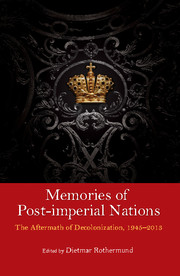Book contents
- Frontmatter
- Contents
- Preface
- Introduction
- 1 Memory of Empire in Britain: A Preliminary View
- 2 Ruptures and Dissonance: Post-colonial Migrations and the Remembrance of Colonialism in the Netherlands
- 3 A Distinctive Ugliness: Colonial Memory in Belgium
- 4 The Post-colonial Encounter in France
- 5 Ideologies of Exceptionality and the Legacies of Empire in Portugal
- 6 Post-colonial Italy: The Case of a Small and Belated Empire: From Strong Emotions to Bigger Problems
- 7 Post-imperial Japan in Transnational Perspective
- 8 Memories of Post-imperial Nations
- 9 A View from the Gallery: Perspective of a ‘Colonized’ on Post-imperial Memories
- Contributors
- Index
6 - Post-colonial Italy: The Case of a Small and Belated Empire: From Strong Emotions to Bigger Problems
Published online by Cambridge University Press: 05 September 2015
- Frontmatter
- Contents
- Preface
- Introduction
- 1 Memory of Empire in Britain: A Preliminary View
- 2 Ruptures and Dissonance: Post-colonial Migrations and the Remembrance of Colonialism in the Netherlands
- 3 A Distinctive Ugliness: Colonial Memory in Belgium
- 4 The Post-colonial Encounter in France
- 5 Ideologies of Exceptionality and the Legacies of Empire in Portugal
- 6 Post-colonial Italy: The Case of a Small and Belated Empire: From Strong Emotions to Bigger Problems
- 7 Post-imperial Japan in Transnational Perspective
- 8 Memories of Post-imperial Nations
- 9 A View from the Gallery: Perspective of a ‘Colonized’ on Post-imperial Memories
- Contributors
- Index
Summary
General histories of European colonial expansion have rarely taken the Italian colonial case into consideration. In the most traditional as well as the best and most recent ones, colonial Italy does not exist, or is barely mentioned. The Italian colonial domains, between 1882 and 1943, in the Horn of Africa, Libya and the Mediterranean area, are consequently ignored.
There are some justifications for this historiographical oblivion: first, the language barrier, but also the fact that Italian colonialism was brief, occupying few territories and bringing few economic benefits to Italy. Nevertheless, such justifications are insufficient, or lead to erroneous consequences: for example concerning the ease, or the difficulty, or in any case the effect, of decolonization.
The role that the colonial dominion played in Italy among Italians in particular has been ignored or underestimated. The tacit assumption is that a small country could not become enthusiastic about such a small empire. The state of affairs being thus, a ‘social-imperialism’, or a jingoistic enthusiasm could not have existed. Consequently, it is believed, decolonization must have been very easy: free of enthusiasm and nostalgia. A Fascist and totalitarian power, it is believed, could not have the strength to change this reality.
On the contrary, the knowledge of Italian colonial history allows the author to rectify such assumptions. During the age of Imperialism, and the ensuing 20 years of the Fascist regime, many Italians did become enthusiastic about their empire. The unusual and rapid decolonization of the Italian colonial dominions – a consequence of the defeat of fascism in the war – complicated rather than facilitated the parallel ‘decolonization of minds’. Indeed, post-colonial Italy had to deal with complicated and difficult legacies of the colonial period. This leads to at least two theoretical reflections: a small empire does not necessarily mean small emotions; intense imperialist emotions can remain, albeit transformed, even though the empire itself has long since ceased to exist.
- Type
- Chapter
- Information
- Memories of Post-Imperial NationsThe Aftermath of Decolonization, 1945–2013, pp. 120 - 149Publisher: Cambridge University PressPrint publication year: 2015
- 9
- Cited by

